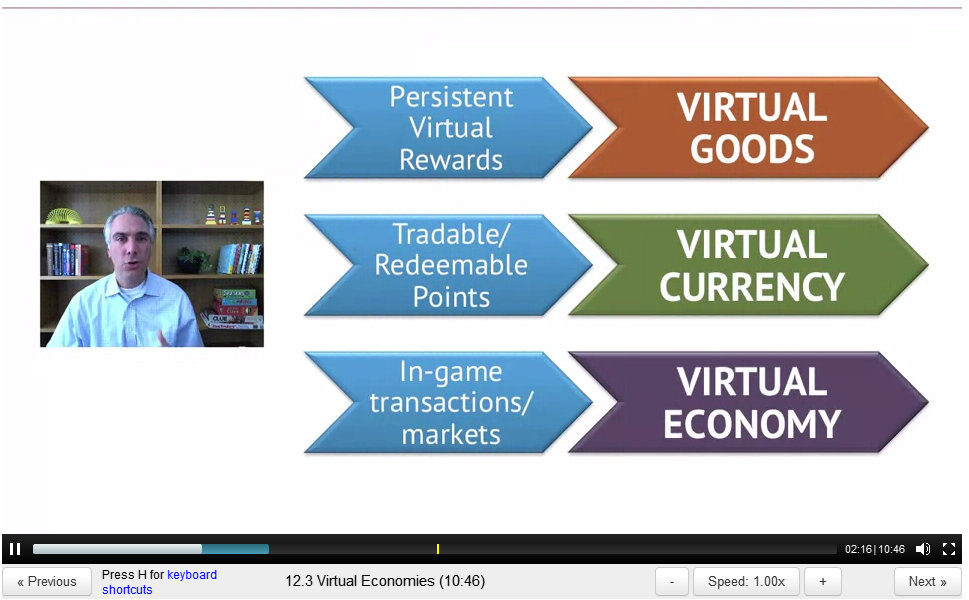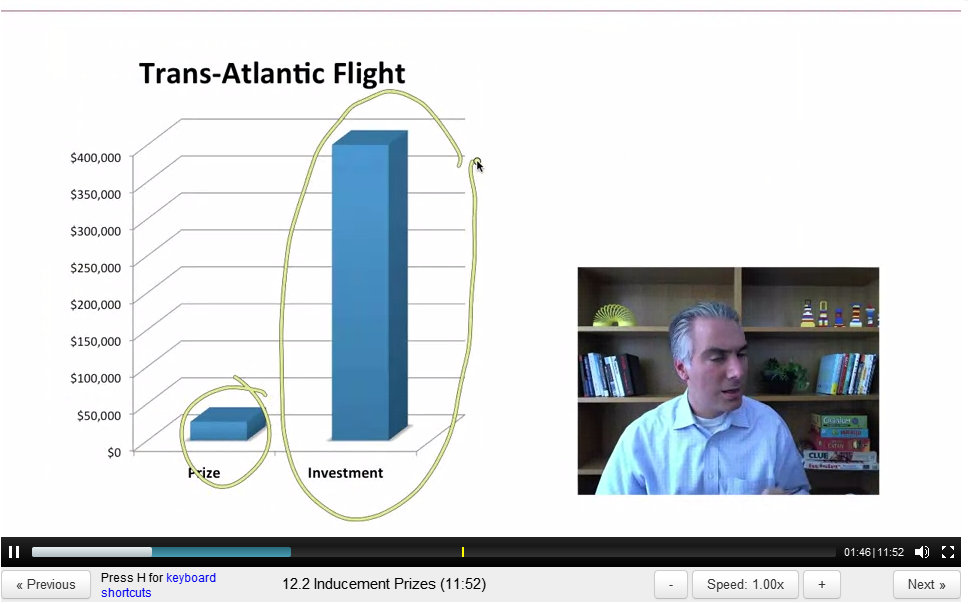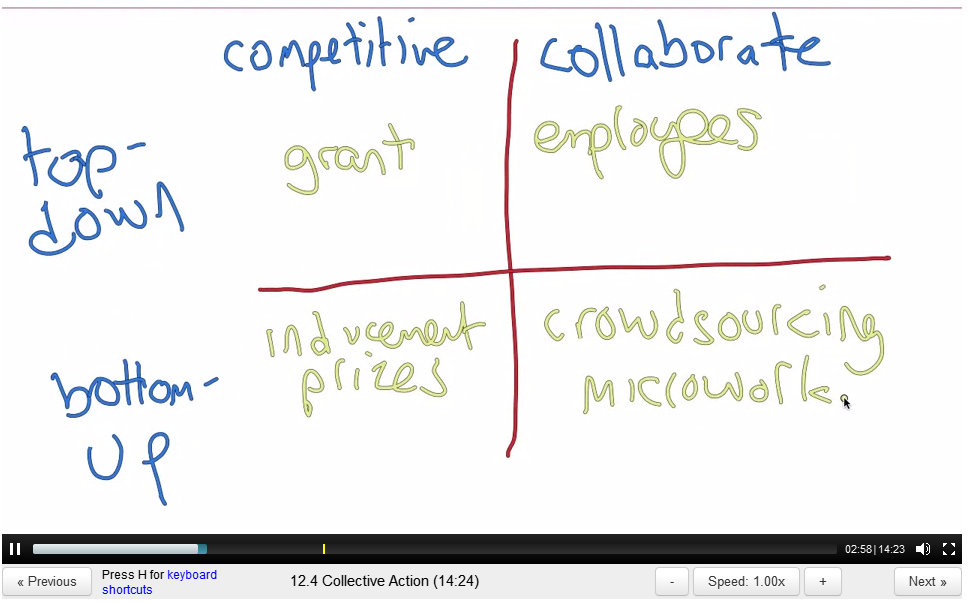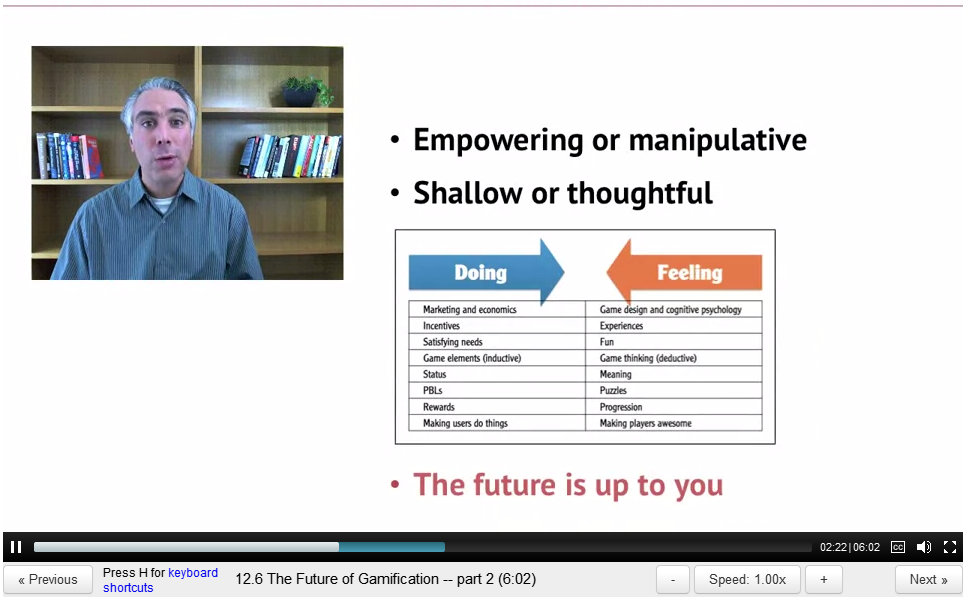PHILADELPHIA, 5 October –- Gamification Lecture 12: Beyond the Basics! Advanced Gamification Techniques. Lecture notes from Kevin Werbach of the University of Pennsylvania’s Wharton Business School, Week 6! Aww, the last class!
The final unit details gamification-related techniques that go beyond those covered throughout the course, and concludes with a look toward the future.
Class Notes – Part 12 – Related Gamification Techniques
12.1 Gamification Techniques: Going beyond the basics
We’ve come a long way!
Our Learning Goals:
1. What is Gamification
different from games; different from serious games
2. Why it might be valuable
marketing; enterprise; internal – not right approach in every case
technique that delivers real results
3. How to do it effectively
not just PBL, but a structure that ties steps you take to objectives
4. Specific Applications
We’ve seen LOTS! In many different domains
Where now?
in this final unit – aspects of gamification – beyond – a glimpse of broader debates in other areas.
12.2 Gamification Techniques: Inducement prizes
Motivational technique that’s gotten a lot of attention lately but has a long tradition. 1919 Raymond Orteig promised $25,000 for Atlantic Crossing, which Charles Lindbergh won.
An Inducement Prize is a contest to motivate a result. An alternative to an R&D grant. Can leverage / incentivize larger investment.
Prizes & Gamification
• A contest to motivate a result
• Fun? An Extrinsic reward, right? – but Self Determination Theory (SDT) suggests that showing Competence, Autonomy, Relatedness are rewards too. X-Prize
Achieve public policy goals like building autonomous cars.
So leverage extrinsic and intrinsic motivations.
• Challenge.gov
12.3 Gamification Techniques: Virtual economies
What happens when we add money, or things that look like money, to a gamified system. If virtual rewards like badges are persistent, then they can start to function as virtual goods. If the system is designed in a way that gives them some scarcity value, then those virgual goods start to have value like real world goods.
• Virtual Goods
• Virtual Currency
• Virtual Economy > EVE Online, Second Life
a “dollar” is just an accounting system that makes exchanges possible. The same thing can be true of point systems in gamified systems if they are exchangeable for other things of value.
Farmville – virtual goods can be unlocked as a way to monetize the system.
Games AND Gamified Systems can have Virtual Goods & Economies. Most of these economies are not built with ideas of gamification, they focus only on tangible rewards. Hence the limitations we’ve discussed. But they could focus on fun and be designed to unlock intrinsic motivation.
Balance! “Faucets & Drains” – ways to put money in, and take it out, of the economy.
Danger! Real money costs real money! Be sure to understand what kinds of obligations you’re taking on. Plus these tend to be extrinsic motivators: hedonic treadmill, crowding out, etc
> intrinsic value from rarity & surprise
12.4 Gamification Techniques: Collective action
Competetive Collaborative
Top-Down Bottom-Up
>>> Grant, Inducement Prize, Employees, Crowdsourcing (microwork)
Microwork > Amazon Mechanical Turk
“HITs” Human Intelligence Tasks – platform for doing these tasks – very successful
BUT money is not the only motivator – is it possible to motivate peeps to participate in these crowdsourced projects without necessarily paying them to do it?
Yes! > Use Gamification! fold.it protein folding
it’s really hard… but it’s also a fun puzzle – humans are good at it!
15 years of research on folding of 3D aids related protein – fold.it users solved in 10 days!
Digitizing Finnish Library – review 2.5 million examples in Word Game.
Metatagging images for search engines
Gamification can be used both in situations where people explicitly know what they’re doing, and in situations where they’re just encouraged to do something fun.
12.5 The future of gamification
What if gamification really becomes pervasive?
Jesse Schell made manifest? Would be… Sight
12.6 Course review and wrap-up
Did “Sight” make you ask questions about nature of gamification’s potential positive and negative possibilities. Ask a set of questions. Be involved directly or indirectly in implementation.
Make Choices:
• Empowering or Manipulative
• Shallow or Thoughtful
• Doing Feeling
• The future is up to you!
Good Luck! Go Forth & Gamify!
Optional Materials
• Anya Kamenetz, The Power of the Prize, Fast Company, May 1, 2008
• Seth Priebach, The Game Layer on Top of the World, TEDxBoston 2010 video






















I continue to watch over your shoulder here as you take your course. And I’ve seen “Sight” so many times now, but I can’t resisit it each time I see it. heh!
Luv the Seth Priebach vid. Yeah, even though FB isn’t perfect, it really is the social layer. I know people would argue against this, but it sure is done for me.
Lecture 12 was the last lecture! And homework 3 was the last project! DONE! haha, well, now we’re supposed to buy his book that comes out in a few weeks! 🙂
The only question now is: school break? or a late start on Human Computer Interaction from Scott Klemmer at Stanford. haha. No more whining about my lazy students! Fitting a class in-between making smartass blog comments and dance class is hard!
I think of Facebook as the New Yellow Pages, or the New Town Square. So I think it’s most useful to develop your ideas, oh, you know, in a place like this salon! 😀 But then it’s nice to run thru the town square and toss fliers at everyone.
I don’t really have anything against FB, and I know Kris has argued that it’s been a powerful site of community for her. Still, for me, it just feels like there’s no there there. Or to put it another way, that FB (and, unfortunately, increasingly YouTube) is/are the New Network TV2.0
Actually, that’s a funny tangent, not too much about gamification, but you know, at the dawn of TV, peeps had the same utopian visions that we have for Internet / Web today. Yet as ultimately manifest, TV for me is a “Vast Wasteland,” the worst drug ever. I feel the Internet sliding that way. We’re being enslaved not forcibly with chains, but very willingly with sexy iPad apps and Facebook et al.
Facebook may have been innovative once, but there’s nothing disruptive about it now, it’s the most mainstream thing on planet earth. Kris totally can meet a group of like minded peeps and have totally real and valuable interactions there… still… for me… I mostly see a lot of crappy billboards polluting public space, colonizing my world, and making visual pollution out of a once beautiful horizon.
Not, you know, that I’m pessimistic or anything…
I’ve heard you talk about television before and I think it becomes the center of your world. But if you pick and choose, using a DVR, there is some great stuff there. I watch maybe an hour of television a night on average. Maybe the picking and choosing is part of the problem though, you really have to study the schedule to find good stuff.
Facebook works for me compared to all the other formats, but your points about the pollution are well taken. Second Life’s mainlands are often horribly polluted (although better since ban on ad lots). I think pollution finds everything eventually, every island on every ocean of the world is polluted with plastic water bottles and other junk. Let’s not even go there.
And of course I know you aren pessimistic or anything… heh